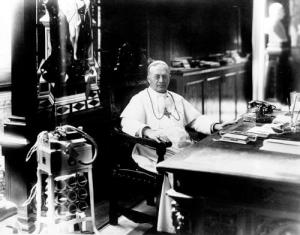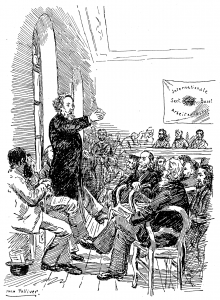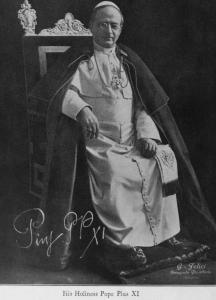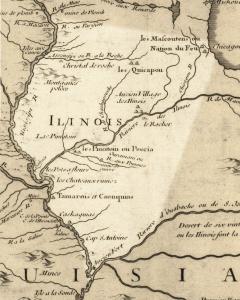In the last offering in this series [1], your humble servant related how by 1931 Socialism had become divided into two main camps. One was Communism, and Pope Pius XI both observed and predicted its atrocities in his encyclical Quadragesimo anno. [2] The other version, which had “kept the name Socialism,” the pope recognized as “surely more moderate,” saying this about it:
“It not only professes the rejection of violence but modifies and tempers to some degree, if it does not reject entirely, the class struggle and the abolition of private ownership. One might say that, terrified by its own principles and by the conclusions drawn therefrom by Communism, Socialism inclines toward and in a certain measure approaches the truths which Christian tradition has always held sacred; for it cannot be denied that its demands at times come very near those that Christian reformers of society justly insist upon.
 “For if the class struggle abstains from enmities and mutual hatred, it gradually changes into an honest discussion of differences founded on a desire for justice, and if this is not that blessed social peace which we all seek, it can and ought to be the point of departure from which to move forward to the mutual cooperation of the Industries and Professions. So also the war declared on private ownership, more and more abated, is being so restricted that now, finally, not the possession itself of the means of production is attacked but rather a kind of sovereignty over society which ownership has, contrary to all right, seized and usurped. For such sovereignty belongs in reality not to owners but to the public authority. If the foregoing happens, it can come even to the point that imperceptibly these ideas of the more moderate socialism will no longer differ from the desires and demands of those who are striving to remold human society on the basis of Christian principles. For certain kinds of property, it is rightly contended, ought to be reserved to the State since they carry with them a dominating power so great that cannot without danger to the general welfare be entrusted to private individuals.
“For if the class struggle abstains from enmities and mutual hatred, it gradually changes into an honest discussion of differences founded on a desire for justice, and if this is not that blessed social peace which we all seek, it can and ought to be the point of departure from which to move forward to the mutual cooperation of the Industries and Professions. So also the war declared on private ownership, more and more abated, is being so restricted that now, finally, not the possession itself of the means of production is attacked but rather a kind of sovereignty over society which ownership has, contrary to all right, seized and usurped. For such sovereignty belongs in reality not to owners but to the public authority. If the foregoing happens, it can come even to the point that imperceptibly these ideas of the more moderate socialism will no longer differ from the desires and demands of those who are striving to remold human society on the basis of Christian principles. For certain kinds of property, it is rightly contended, ought to be reserved to the State since they carry with them a dominating power so great that cannot without danger to the general welfare be entrusted to private individuals.
“Such just demands and desire have nothing in them now which is inconsistent with Christian truth, and much less are they special to Socialism. Those who work solely toward such ends have, therefore, no reason to become socialists.” (Quadragesimo anno, §113-115)
So if all one is seeking is to abolish the political power of capital ownership, rather than capital ownership itself, this isn’t contrary to Catholic doctrine. On the contrary, it is in complete accord with it. But it wasn’t every non-communist socialist who had abandoned the quest. As Pius XI pointed out,
“Yet let no one think that all the socialist groups or factions that are not communist have, without exception, recovered their senses to this extent either in fact or in name. For the most part they do not reject the class struggle or the abolition of ownership, but only in some degree modify them.” (Ibid, §116)
 Still, the question remained: what if socialists gave up on the idea of abolishing private property in the means of production? Would Socialism then be suitable for Catholics to embrace? There was one problem. The Holy Father put it this way:
Still, the question remained: what if socialists gave up on the idea of abolishing private property in the means of production? Would Socialism then be suitable for Catholics to embrace? There was one problem. The Holy Father put it this way:
“For, according to Christian teaching, man, endowed with a social nature, is placed on this earth so that by leading a life in society and under an authority ordained of God he may fully cultivate and develop all his faculties unto the praise and glory of his Creator; and that by faithfully fulfilling the duties of his craft or other calling he may obtain for himself temporal and at the same time eternal happiness. Socialism, on the other hand, wholly ignoring and indifferent to this sublime end of both man and society, affirms that human association has been instituted for the sake of material advantage alone.
“Because of the fact that goods are produced more efficiently by a suitable division of labor than by the scattered efforts of individuals, socialists infer that economic activity, only the material ends of which enter into their thinking, ought of necessity to be carried on socially. Because of this necessity, they hold that men are obliged, with respect to the producing of goods, to surrender and subject themselves entirely to society. Indeed, possession of the greatest possible supply of things that serve the advantages of this life is considered of such great importance that the higher goods of man, liberty not excepted, must take a secondary place and even be sacrificed to the demands of the most efficient production of goods. This damage to human dignity, undergone in the ‘socialized’ process of production, will be easily offset, they say, by the abundance of socially produced goods which will pour out in profusion to individuals to be used freely at their pleasure for comforts and cultural development. Society, therefore, as Socialism conceives it, can on the one hand neither exist nor be thought of without an obviously excessive use of force; on the other hand, it fosters a liberty no less false, since there is no place in it for true social authority, which rests not on temporal and material advantages but descends from God alone, the Creator and last end of all things.” (Ibid, §§118-119)
 The Socialism that Pius XI observed, while on the surface renouncing the violence of Communism, envisioned a society that could only materialize through a prodigious use of force. Simply put, human labor would be directed in the supposed interests of society as a whole, by those who had attained the political power to so direct it. People would become subject to what was, in essence, forced labor. And this loss of liberty would be justified in terms of the only good that Socialists were capable of imagining: material wealth. Such a false (and deceitful) god could never be imported into Catholicism.
The Socialism that Pius XI observed, while on the surface renouncing the violence of Communism, envisioned a society that could only materialize through a prodigious use of force. Simply put, human labor would be directed in the supposed interests of society as a whole, by those who had attained the political power to so direct it. People would become subject to what was, in essence, forced labor. And this loss of liberty would be justified in terms of the only good that Socialists were capable of imagining: material wealth. Such a false (and deceitful) god could never be imported into Catholicism.
Human beings are much more than producers of goods, but that was all that the Socialism that Pius XI was describing could see about them. Clearly, such a Socialism would be no improvement upon Capitalism at all. Although Capitalism reduces labor to a commodity, this Socialism would make draft animals of humans.
This has been the problem with Socialism. In order for it to work, you have to force everyone to participate. And then it isn’t altogether clear that Socialism working is a desirable outcome.
The icon of St. Joseph the Worker is by Daniel Nichols.
Please go like Christian Democracy on Facebook here. Join the discussion on Catholic social teaching here.












